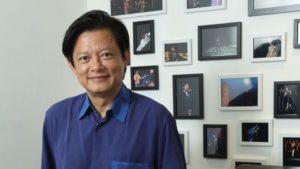
Q&A: Warren Mok On His Transition From Operatic Tenor To Artistic Director of Opera Hong Kong & the Macau International Music Festival
By Francisco SalazarWarren Mok is one of Hong Kong’s most distinguished tenors as he has performed in many of the world’s greatest theaters.
Since his European debut at the Deutsche Oper Berlin in 1987, Mok has appeared at the Paris Opera, Teatro dell’Opera di Roma, Teatro Comunale di Bologna, Opera Australia in Sydney Opera House, Teatro Colón in Buenos Aires, Royal Danish Opera, Teatro di San Carlos Lisbon, Seattle Opera, Bolshoi Theatre, ABAO Bilbao and Carnegie Hall among others.
Now 58, Mok is taking on new roles in the opera world. He is attempting to bring the art form to younger audiences and is helping train the next generation of opera singers.
In a recent interview with OperaWire, Mok spoke about his roles as Artistic Director, director, and his singing career.
OperaWire: You’re the artistic director for Opera Hong Kong and the Macau International Music Festival. Can you tell me about the work you do with these companies?
Warren Mok: I created Opera Hong Kong with my friends 14 years ago. We showcase three productions a year collaborating with companies all over the world. We’ve rented sets from the Rome Opera and the LA Opera trying to do the best with a limited budget. Our goal is to promote opera in Hong Kong because it is an international art form. So this is a great way to expose the people of Hong Kong to western culture and mix it with the Chinese culture.
For example, I use a local chorus and hire local singers and I have a young artist program as well. And for leading roles, I hire singers from around the world. It really integrates different cultures because when the opera is presented, many different nationalities are represented.
OW: Do you direct opera with the company?
WM: Yes, I direct and produce opera. Recently, I directed “La Bohème” and “The Magic Flute” and I will produce “Aida” this season.
OW: With your experience performing in the West, how is the audience different in Chinese culture and is opera culturally accepted in Hong Kong and China?
WM: Since Hong Kong was westernized years ago, opera is accepted and it is part of their life. What I am doing is trying to attract younger audiences to show them what opera is really like. I want people to stop thinking opera is only for rich people. That is a misconception. I give students and senior citizens discounts.
But in Mainland China, it is still relatively new. There are many theaters but there is a lack of programs. The best theater is the National Center for the Performing Arts in Beijing and they produce 16 to 20 operas a year. They bring many famous directors and collaborate with a lot of opera companies around the world.
That being said, the art form is growing and most of the audience that goes is around 30 to 40 years old. The older audience doesn’t understand Western culture that well because they weren’t exposed to it. So older audiences don’t care about opera. However, I wouldn’t say it’s as popular as pop song culture and China still has its own opera.
OW: What are some of the differences between Western opera and Chinese opera and is Chinese Opera more popular?
WM: It’s very different. Chinese opera is sung differently and it takes years of training, even longer than Western opera. Chinese Opera is very nasal, narrow and high and it is really hard to practice. And there is a completely different technique involved. To be honest, it’s not very popular in China and only older generations usually attend.
OW: How are you balancing your singing career with all these other jobs you are taking on?
WM: I’ve sung for 35 years and I am no longer young anymore. My voice is still in good shape but I am beginning to sing fewer operas and I’m doing a lot more concerts. As a singer, I’ve done 60 roles and I’ve performed all around the world. I’m very satisfied and I did all the roles that I wanted to do. So I have no regrets and now I am focusing more on being a producer and stage director. There is no age limit for that. I also started to teach and I really enjoy it. I share a lot of insight from my experiences.
OW: So these days, what are you still performing?
WM: I still do concerts and TV shows and two to three operas a year. This year I did two “Turandot” productions and a “Carmen” production. So that’s it for this year and I will wait for next year.
OW: Now that you are teaching, what is some advice you give to your students?
WM: For Chinese singers, I think it is important for them to learn Italian, German and French. English is a tool and it is a must. When you audition, the first thing judges want to hear is the language. They don’t care how beautiful your voice is. They want to see if you can sing the language clearly and correctly.
Then comes vocal technique and in China, it is quite good. But then I encourage my students to go to the west because opera is from the West and that is where the best coaches are. That is why many Chinese singers go abroad to get their masters, to learn language, interpretation and Western culture.


